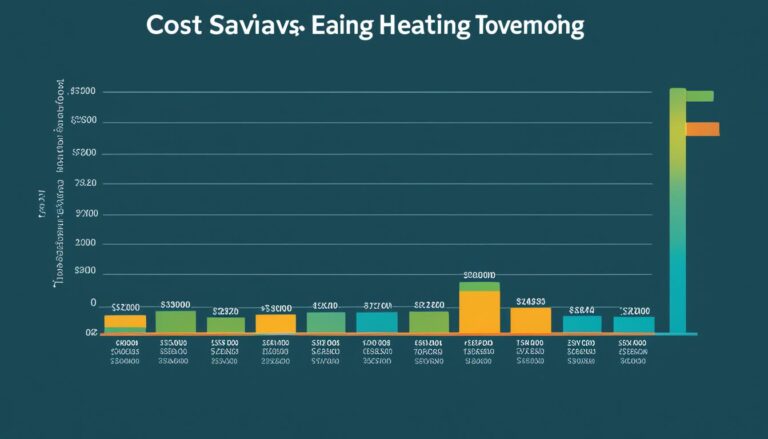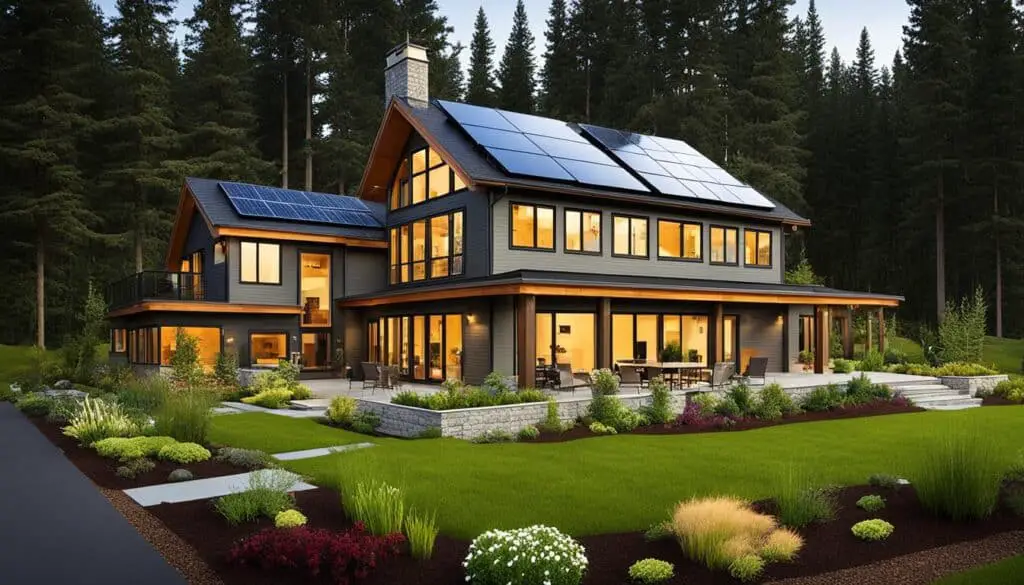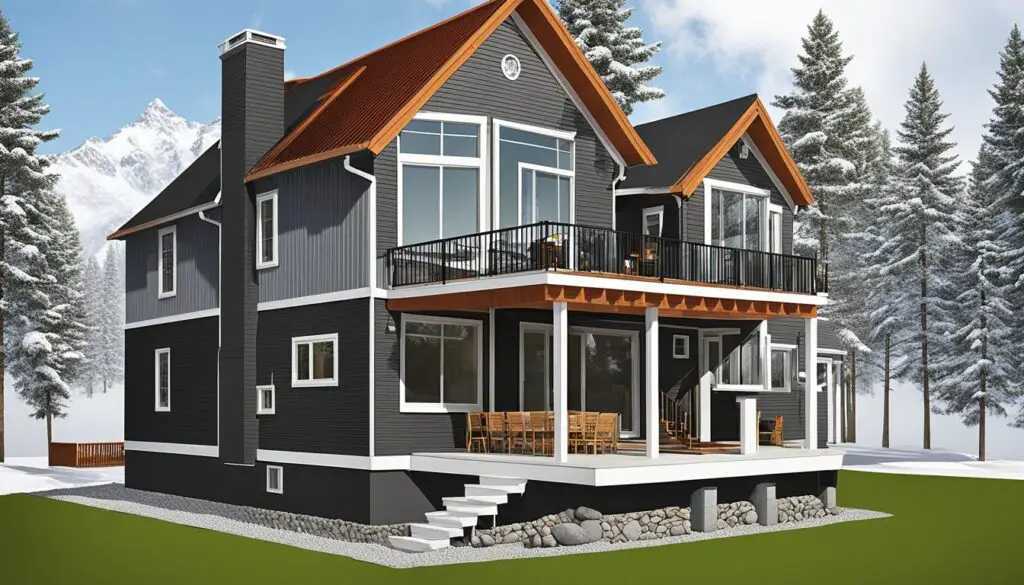As a homeowner, finding an efficient and eco-friendly solution for regulating your home’s temperature is a top priority. That’s where geothermal heating and cooling systems come in. These systems utilize the earth’s natural heat to provide cost-efficient and environmentally friendly home comfort.
By tapping into the stable temperatures found underground, geothermal systems can effectively regulate the temperature of your home with minimal energy consumption. This not only translates to significant cost savings but also reduces your carbon footprint, making it a win-win for both your wallet and the environment.
Key Takeaways:
- Geothermal heating and cooling systems offer cost-efficient home temperature regulation.
- These systems utilize the earth’s natural heat, making them eco-friendly.
- By tapping into underground temperatures, geothermal systems minimize energy consumption.
- Geothermal heating and cooling result in significant cost savings for homeowners.
- Switching to geothermal systems helps reduce your carbon footprint.
How Does Geothermal Heating and Cooling Work?
A geothermal heating and cooling system operates by utilizing the earth’s stable underground temperatures. A heat pump is used to transfer heat between the home and the ground. During the winter, the heat pump extracts heat from the ground and transfers it inside the home to provide warmth. In the summer, the process is reversed, and the heat pump moves heat from the home into the ground to provide cooling. This heat exchange process is highly efficient and can effectively regulate the temperature of a home throughout the year.
By harnessing the consistent temperatures found below the earth’s surface, geothermal systems can provide efficient heating and cooling for homes. Let’s take a closer look at how this process works:
- Geothermal heat pumps are installed in the home, usually either in the basement or outdoors.
- The heat pump uses a loop system, which consists of pipes filled with refrigerant that circulate underground.
- During the winter, the heat pump extracts heat from the ground through the loop system.
- The extracted heat is then compressed, raising its temperature.
- The heated refrigerant is then transferred to the air handler, where it releases its heat into the home.
- The process is reversed in the summer, with the heat pump extracting heat from the home and transferring it into the cooler underground temperatures.
- This heat exchange process allows for energy-efficient heating and cooling, as geothermal systems only require electricity to power the heat pump and the circulation of the refrigerant.
It’s important to note that the effectiveness of a geothermal system depends on the conductivity of the soil or rock in the area. Areas with higher conductivity can provide more efficient energy transfer and better overall performance. Additionally, the size and specifications of the geothermal system should be properly designed and installed to ensure optimal functionality.
Benefits of Geothermal Heating and Cooling System
“Geothermal heating and cooling systems offer energy-efficient temperature regulation for homes, providing both heating and cooling capabilities in one system. By utilizing the earth’s natural heat exchange process, these systems can help homeowners achieve significant cost savings while minimizing their environmental impact.” ~ John Davis, Geothermal System Expert
Installing a geothermal heating and cooling system in your home offers several notable benefits:
- Energy Efficiency: Geothermal systems use less energy compared to traditional heating and cooling systems, resulting in lower energy bills.
- Cost Savings: By using the earth’s natural heat, geothermal systems can deliver long-term cost savings, despite the initial investment.
- Sustainability: Geothermal systems are environmentally friendly, as they rely on renewable energy and reduce reliance on fossil fuels.
- Quiet Operation: Geothermal systems operate quietly, providing a peaceful and comfortable environment.
With their efficient operation and eco-friendly nature, geothermal heating and cooling systems are a smart choice for homeowners looking to prioritize energy efficiency and reduce their carbon footprint.
Geothermal Heating and Cooling System Diagram
Below is a visual representation of how a geothermal heating and cooling system works:
Energy Efficiency and Cost Savings
Geothermal heating and cooling systems are widely recognized for their energy efficiency and the resulting cost savings they provide for homeowners. Unlike traditional heating and cooling methods that rely on the burning of fossil fuels, geothermal systems harness the stable temperature of the earth to regulate the temperature in your home. This reliance on renewable energy translates into lower utility bills and significant long-term cost savings.
Lower utility bills: By utilizing the earth’s natural heat, geothermal systems require less energy to maintain comfortable indoor temperatures. This translates to lower utility bills for homeowners, allowing them to save money month after month.
Reduced reliance on fossil fuels: Geothermal systems operate without the need for fossil fuels, reducing the dependence on these non-renewable resources. By transitioning to geothermal heating and cooling, homeowners can play an active role in reducing greenhouse gas emissions and minimizing their carbon footprint.
| Benefits of Geothermal Systems | |
|---|---|
| Energy-efficient heating and cooling | Lower utility bills |
| Reduction in fossil fuel reliance |
As shown in the table above, geothermal systems offer energy-efficient heating and cooling, resulting in lower utility bills for homeowners. By reducing reliance on fossil fuels, geothermal systems contribute to a more sustainable future while providing tangible financial benefits.
Geothermal heating and cooling systems provide cost-effective and environmentally friendly solutions for homeowners. By harnessing the energy efficiency of the earth’s natural heat, these systems not only reduce utility bills but also reduce our reliance on fossil fuels, making a positive impact on the environment.
Investing in an energy-efficient geothermal system not only yields immediate cost savings on utility bills but also contributes to a greener and more sustainable future. By embracing geothermal technology, homeowners can enjoy the benefits of reduced energy consumption, lower utility bills, and an overall decreased impact on the environment.
Environmental Benefits of Geothermal Systems
Geothermal heating and cooling systems offer significant environmental benefits, making them an excellent choice for environmentally friendly heating and cooling. These systems harness the power of geothermal energy, which is a renewable energy source with minimal environmental impact.
By leveraging geothermal energy, geothermal systems help to reduce carbon emissions and decrease dependence on non-renewable energy sources. This plays a crucial role in addressing climate change and promoting a sustainable future.
Switching to geothermal heating and cooling can have a profound impact on reducing a household’s carbon footprint. Unlike traditional heating and cooling methods that rely on fossil fuels, geothermal systems use the earth’s natural heat, resulting in lower carbon emissions and a more sustainable lifestyle.
Geothermal energy is an abundant and renewable resource. By tapping into this clean and infinitely available source of energy, geothermal systems contribute to a greener and more environmentally conscious society.
Installing a geothermal system is a proactive step towards promoting sustainability and reducing the environmental impact of your home. By choosing geothermal, you can make a positive impact on reducing carbon emissions and preserving our planet’s precious resources.
| Environmental Benefits of Geothermal Systems |
|---|
| Utilizes geothermal energy, a renewable energy source |
| Reduces carbon emissions |
| Decreases dependence on non-renewable energy sources |
| Helps tackle climate change |
| Contributes to a sustainable future |
Geothermal systems harness the power of geothermal energy, a renewable energy source, to provide environmentally friendly heating and cooling. By reducing carbon emissions and decreasing reliance on non-renewable energy sources, geothermal systems play a significant role in minimizing our impact on the environment.
Longevity and Durability
Geothermal heating and cooling systems are renowned for their long-lasting performance and durability. Unlike traditional heating and cooling systems that require regular repairs or replacements, geothermal systems are built to withstand various weather conditions and can last for decades with proper maintenance.
These systems have fewer moving parts, reducing the risk of wear and tear. The result is a highly reliable and low-maintenance heating and cooling solution for homeowners. With fewer components to replace or repair, geothermal systems offer long-term savings and peace of mind.
The long-lasting nature of geothermal systems makes them a cost-effective investment in home comfort. Whether you live in a region with extreme temperatures or experience fluctuations throughout the year, a geothermal system can maintain consistent and reliable indoor temperatures, ensuring your comfort all year round.
Investing in geothermal heating and cooling is not only a smart financial choice but also an environmentally friendly one. With their long lifespan and low maintenance requirements, geothermal systems contribute to reducing waste and minimizing the environmental impact of your home’s HVAC systems.
By choosing a geothermal system, you are not only ensuring long-lasting comfort for your home but also taking a step towards a sustainable future.
| Benefits of Geothermal Systems | Traditional Systems | Geothermal Systems |
|---|---|---|
| Lifespan | 15-20 years | Decades |
| Maintenance Requirements | Regular and frequent | Low and infrequent |
| Reliability | Varying | High |
Quote from a satisfied homeowner:
“Installing a geothermal heating and cooling system was one of the best decisions I made for my home. Not only has it provided consistent comfort throughout the years, but the durability and low maintenance requirements have also saved me time and money. I highly recommend geothermal systems to anyone looking for a reliable and long-lasting HVAC solution.”
Quiet and Comfortable Operation
Geothermal heating and cooling systems operate silently, ensuring a peaceful and comfortable home environment. Unlike traditional HVAC systems, these systems produce minimal noise, making them ideal for light sleepers or homes where minimizing noise disturbance is a priority.
With geothermal systems, you can enjoy a consistent indoor temperature throughout your home. Say goodbye to the discomfort of hot and cold spots that can occur with traditional forced-air systems. Geothermal systems provide a consistent and even distribution of heating and cooling, ensuring optimal comfort in every room.
Experience the tranquility and consistent comfort of geothermal heating and cooling in your home today.
| Benefits of Quiet and Comfortable Operation | Explanation |
|---|---|
| Silent Heating and Cooling | Geothermal systems operate quietly, minimizing noise disturbance in your home environment. |
| Consistent Indoor Temperature | Geothermal systems provide an even distribution of heating and cooling, eliminating hot and cold spots. |
| Peaceful Sleep | The minimal noise from geothermal systems ensures a peaceful sleep environment, perfect for light sleepers. |
| Optimal Comfort | Enjoy consistent and comfortable temperatures in every room of your home with geothermal heating and cooling. |
Financial Incentives and Return on Investment
Investing in a geothermal heating and cooling system can provide you with a range of financial incentives and a strong return on investment (ROI). Many governments and utilities recognize the importance of promoting energy efficiency and offer various incentives to encourage the installation of geothermal systems. These incentives can help offset the upfront costs associated with installing a geothermal system, making it a more affordable option for homeowners.
One of the most common financial incentives offered for geothermal systems is rebates. These rebates are typically offered by local governments or utility companies and provide a direct financial benefit to homeowners who install geothermal systems. Rebates can significantly reduce the overall cost of the system, making it more financially viable for many households.
In addition to rebates, there are also tax credits available for geothermal systems. These tax credits allow homeowners to deduct a portion of the installation costs from their annual tax bill. The specific details and eligibility requirements for tax credits vary depending on the jurisdiction, so it’s important to check with your local tax authority or consult a tax professional to fully understand the potential savings.
Furthermore, energy efficiency incentives are often provided to homeowners who invest in geothermal heating and cooling systems. These incentives aim to promote the use of energy-efficient technologies and typically offer financial assistance based on the energy savings achieved with the geothermal system. By using less energy to heat and cool your home, you can reduce your utility bills and qualify for additional incentives.
When considering the financial benefits of a geothermal system, it’s crucial to evaluate the payback period. The payback period refers to the amount of time it takes for the cost of the system to be recouped through energy savings. Geothermal systems are known for their high energy efficiency, which means they can provide significant savings on utility bills. As a result, the payback period for a geothermal system is often relatively short compared to other heating and cooling options. This allows homeowners to start enjoying the financial benefits of their investment sooner.
Financial Incentives Summary:
- Rebates: Many governments and utility companies offer rebates, reducing the upfront cost of a geothermal system.
- Tax Credits: Homeowners may qualify for tax credits, providing additional financial relief.
- Energy Efficiency Incentives: Financial assistance based on the energy savings achieved with geothermal systems.
- Short Payback Period: High energy efficiency leads to quick returns on your investment through reduced utility bills.
Investing in a geothermal heating and cooling system not only offers environmental benefits but also provides financial incentives and a strong return on investment. With rebates, tax credits, and energy efficiency incentives available, installing a geothermal system becomes more affordable. Additionally, the high energy efficiency of geothermal systems ensures a relatively short payback period, allowing homeowners to enjoy the financial benefits sooner. It’s a wise long-term investment that aligns with both your finances and the environment.
Conclusion
Geothermal heating and cooling systems offer numerous advantages for homeowners. With their energy efficiency, cost savings, and environmental benefits, these systems provide sustainable and reliable home comfort while reducing reliance on fossil fuels and minimizing carbon emissions.
One of the key advantages of geothermal systems is their ability to harness the earth’s natural heat, resulting in significant energy savings. By utilizing renewable energy, geothermal systems can help homeowners lower their utility bills and achieve long-term cost savings.
Not only are geothermal systems good for your wallet, but they also have a positive impact on the environment. By reducing the reliance on traditional heating and cooling methods, geothermal systems contribute to carbon footprint reduction and the promotion of a more sustainable future.
Furthermore, geothermal systems offer long-lasting durability, ensuring that homeowners can enjoy the benefits for many years to come. Added to this is the quiet and comfortable operation, providing a peaceful and consistent indoor temperature throughout the year.
If you’re considering an efficient, cost-effective, and environmentally friendly way to regulate your home’s temperature, geothermal heating and cooling systems are an excellent choice. Invest in sustainable home comfort and reap the benefits of energy efficiency, cost savings, and environmental stewardship.
FAQ
What are the advantages of geothermal heating and cooling?
Geothermal heating and cooling systems offer numerous advantages, including energy efficiency, cost savings, and environmental benefits. These systems utilize the earth’s natural heat, providing efficient and eco-friendly home comfort.
How does geothermal heating and cooling work?
Geothermal systems utilize the earth’s stable underground temperatures. A heat pump is used to transfer heat between the home and the ground. In the winter, the heat pump extracts heat from the ground to provide warmth, while in the summer, it moves heat from the home into the ground to provide cooling.
How do geothermal systems achieve energy efficiency and cost savings?
Geothermal systems achieve high levels of efficiency by relying on the stable temperature of the earth instead of burning fossil fuels. This reduces energy consumption, resulting in lower utility bills and long-term cost savings. Geothermal systems also decrease the demand for fossil fuels, reducing greenhouse gas emissions.
What are the environmental benefits of geothermal systems?
Geothermal systems use geothermal energy, a renewable energy source with minimal impact on the environment. By utilizing this clean and abundant energy source, geothermal systems reduce carbon emissions and dependence on non-renewable energy sources, contributing to a more sustainable future.
How long do geothermal heating and cooling systems last?
Geothermal systems are built to withstand various weather conditions and can last for decades with proper maintenance. Unlike traditional systems, geothermal systems have fewer moving parts and are less prone to wear and tear, offering homeowners long-lasting durability and reliability.
Are geothermal systems quiet?
Yes, geothermal systems operate quietly, providing a comfortable and peaceful home environment. Compared to traditional HVAC systems, geothermal systems produce minimal noise, which is particularly beneficial for light sleepers or those looking to reduce noise disturbance.
Are there any financial incentives for installing a geothermal system?
Yes, many governments and utilities offer financial incentives such as rebates and tax credits to encourage the installation of energy-efficient systems like geothermal. These incentives can help offset upfront costs, and the energy savings achieved through geothermal heating and cooling can result in a relatively short payback period.
What are the overall advantages of geothermal heating and cooling?
Geothermal heating and cooling systems offer numerous advantages, including energy efficiency, cost savings, environmental benefits, longevity and durability, quiet operation, and potential financial incentives. They provide sustainable and reliable home comfort while reducing reliance on fossil fuels and minimizing carbon emissions.



